|
Play List: 4. Corinne 7. The Mormons 9. Lucy Brandon 10. Storm-Beaten 11. Lady Clare 13. Bachelors 14. Constance 15. Lottie 16. Agnes 17. Alone in London 18. Sophia 19. Fascination 20. The Blue Bells of Scotland 21. Partners 24. Angelina! 25. The Old Home 26. A Man’s Shadow 27. Theodora 29. Clarissa 30. Miss Tomboy 32. Sweet Nancy 33. The English Rose 36. Marmion 37. The Gifted Lady 38. The Trumpet Call 39. Squire Kate 40. The White Rose 42. The Black Domino 44. The Charlatan 45. Dick Sheridan 47. Lady Gladys 48. The Strange Adventures of Miss Brown 49. The Romance of the Shopwalker 52. Two Little Maids from School ___ |
|
ROBERT WILLIAMS BUCHANAN (1841 - 1901) |
|
|
|
|
|
|
|
|
THEATRE REVIEWS 27. Theodora (1889) - continued |
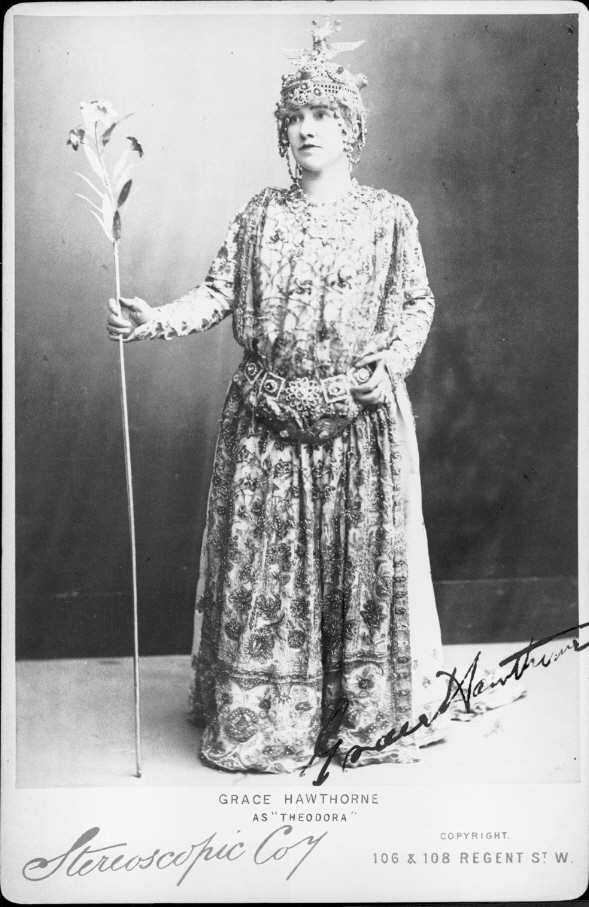 |
|
[Grace Hawthorne as Theodora. Click the picture for a larger version.]
The Theatre (1 June, 1890) “THEODORA.” Play in six acts, adapted by Mr. ROBERT BUCHANAN, from “Sardou’s masterpiece.” |
|
|
|
Officers, Lords-in-Waiting, Ostiaries, Scholars of the Emperor’s Body Guard, Goths, Slaves, Servants, “Theodora” is a play that was written specially for Madame Bernhardt; it is one in which she is great, because she is a great actress, but it is not a good play, though a showy one. For the critical to enjoy it, the heroine must be impersonated by an artist of the first rank, for she has to show us how a girl who began life in the circus could so bewitch an emperor as to become his consort, and who after she wore the diadem could still delight in mingling with her former companions; who whilst being the ruling power of the state, could risk all in her wild mad passion for a young Greek; a woman who can wind her husband round her finger, who is as iron to her enemies but as wax to her lover, to save whom she will in cold blood pierce to the heart with a bodkin taken from her hair, an unfortunate creature, who might under the agony of the torture betray his fellow conspirator. Miss Grace Hawthorne has already filled the part with considerable success in the provinces, and though she could not altogether look the character or rise to the heights of grandeur that it requires, succeeded in rendering it a capable performance, and one far greater than was anticipated. Mr. Leonard Boyne was at his best when confessing how unwittingly he had betrayed his fellow conspirators. Mr. Cartwright’s rendering of Marcellus left nothing to be desired; his great scene when beseeching Theodora to put an end to him was most effective. Mr. W. H. Vernon was to the letter the crafty, superstitious, and craven emperor. Mr. George W. Cockburn, Miss Marie Stuart, and Miss Dolores Drummond, were good. The piece is splendidly staged, the dresses are of the costliest description, and the mounting altogether lavish, so that as a spectacle alone “Theodora” is likely to attract large audiences for some time to come. Mr. Buchanan’s version is a good one, but though his allowing the empress to poison herself, and so die with Andreas, affords a tableau and a scene for the heroine, I doubt whether it is as effective as the curtain falling on the supposition that she will suffer from the silken bowstring, as in the original. ___
Time (June, 1890 - pp.662-666) Like Macbeth, we have of late been supping full of horrors. The theatrical menu has consisted of three courses. Two ladies and one gentleman - Theodora, Esther Sandraz, and Paul Kauvar. The three are all members of one family, and they have a strong family likeness. THEODORA. The Byzantine, the French, the English, the American. The first is “as God made her,” and with that, as these are not historical notes, we have nothing to do. For the French Theodora - she is a creature, artistically speaking, after Sarah Bernhardt’s own heart. The play, as it is Sardou’s, is, by compulsion, clever. But it has not escaped the risks necessarily attending all works of art fashioned to order. “Written round” Madame Bernhardt, the character, the language, the incidents, the situations, do not seem to grow inevitably, inexorably, as necessary parts of one organic whole of art. They seem to be fitted on to the personal peculiarities and individual wishes of one great artist. Alec Nelson [pseudonym of Edward Aveling] [Note: This review appears on the Marxist Internet Archive in the Eleanor Marx Dramatic Notes section.] ___
The Stage (22 August, 1890 - p.10) I am pleased to learn that Mr. H. A. Freeman is once more at his post at the Grand. Théodora was played on Monday with every indication of success, and the opinion was once more expressed that Miss Hawthorne has in this play excelled all her former efforts. A den of real live lions was introduced in the circus scene to be fed by the fair Théodora, and an explanation was made that on the remaining evenings they would appear in a larger cage. It would be more historically accurate to have no cage at all, and, truth to tell, the two poor animals did not look fierce enough to need very much restraint. Possibly some fuller account of this production may appear in next week’s issue. _____ The arrangements at the Standard for the next four weeks comprise Dorothy for six nights, from 25th inst., with, of course, Mr. Arthur Williams as Lurcher; then, for two weeks, Miss Grace Hawthorne in Théodora, with the lions, and the much-advertised dresses of fabulous price; and on 15th September a return visit of Falka for six nights only. ___
The Stage (19 September, 1890 - p.5) NOTTINGHAM.—ROYAL (Manager, Mr. C. T. Burleigh).—Attracted by the reports of the success of Miss Grace Hawthorne and her well-chosen Co. to support her in Theodora, and further by the announcement that a den of live lions would be introduced on the stage, this theatre was on Monday well filled in every part. Miss Hawthorne appeared in the title-rôle, and played with vigour the difficult part of the Empress. She was well supported by Mr. William Farren, jun., as the Emperor; and Mr. Fuller Mellish never played better than in the character of Andreas. Miss Louisa Wyatt was the gipsy, Tamyris; she sustained the character most creditably. Belisarius, Marcellus, and Callirhoe were well filled by Messrs. Arthur Estcourt, Howard Sturge and Miss Marie Stuart. ___
The Sheffield and Rotherham Independent (20 October, 1890 - p.5) LION CHRISTENING AT THE THEATRE ROYAL. A more interesting and appropriate place for the christening of baby lions than was found on Saturday night at the Theatre Royal, for that ceremony, in regard to the two cubs recently born in Wombwell’s Menagerie, it would be difficult to conceive. The scene chosen was that wherein two almost fully grown lions are introduced to add reality to the circus incident in “Theodora.” At the conclusion of her ordinary efforts in this scene, Miss Grace Hawthorne (Theodora) was asked whether she would not see “the little ones” before leaving. The diminutive creatures were then brought on the stage, and amid loud applause the talented actress placed a ribbon round the neck of each, and christened one, in the name of the Mayor and Corporation and also of the Master Cutler, “Theodora, empress of Sheffield.” The other was named “Robert Buchanan, poet laureate of all the lions in England.” Mr. Buchanan, it should be explained, provided Miss Hawthorne with her present adaptation of Sardou’s play. The novel incident seemed to greatly please the large audience. ___
The Nottingham Evening Post (20 October, 1890 - p.2) CHRISTENING THE LIONS. An interesting ceremony took place at Sheffield Theatre Royal on Saturday night during the progress of the play of “Theodora.” It appears that a couple of lions were cubbed at Wombwell’s Menagerie in Sheffield last Wednesday, and Miss Grace Hawthorne obtained permission to christen the baby “monarchs” at the theatre. Accordingly, on Saturday night, in the second scene of the tragedy, the actress took the cubs in her arms, fastened a ribbon round their necks, and named one of them “Theodora, Empress of Sheffield,” and the other “Robert Buchanan,” in compliment to the gentleman who adapted the play from the French. The incident created a great amount of interest. ___
The Stage (19 February, 1891 - p.13) LONDON THEATRES. THE PAVILION. An enormous audience that filled the house to overflowing assembled at the Pavilion on Monday for the first night of the week’s engagement of Miss Grace Hawthorne and her Theodora company. It would be rather late in the day to say much about Robert Buchanan’s version of M. Sardou’s semi-historical drama, and Miss Hawthorne’s impersonation of the ex-circus dancer who rose to be Justinian’s consort has also been often discussed before. Moulded as it is upon the lines of Sarah Bernhardt’s Theodore, Miss Hawthorne’s is scarcely an inspired performance, and only now and again do we catch glimpses of the power that elevates this singular woman from the arena to the throne. Miss Hawthorne, however, has carefully studied the character, and her impersonation bears the stamp of zeal, perseverance, and well- prepared effect. Perhaps she is most successful in the comedy passages with Tamyris, the sorceress, and with the pair of caged lions in act one, where she shows as well as could be the reckless Bohemian nature of the mountebank’s daughter. The love scenes with Andreas and the wheedling of Justinian are also good points. There is some power in the stirring scene where the Empress stabs with her stiletto the self-sacrificing centurion Marcellus; Miss Hawthorne rose to the height of the occasion both when Theodora refuses to fly from the mob and where she claims as her own her old lover Andreas, who has just insulted her in the Hippodrome; and the last scene of all was not without a certain tenderness and pathos. Mr. Fuller Mellish declaimed ore rotundo in the many telling lines assigned to Andreas the Greek, and quite realized the type of man whom the Empress would “honour” with her affection. An admirable piece of sound, virile acting was given by Mr. George W. Cockburn as Marcellus, the passage where the Centurion exhorts Theodora to slay him being delivered with moving, though unstrained energy. Mr. Cockburn’s sonorous baritone voice enabled him to produce some effect in act four, where he sings “off” his own song, entitled “Marcellus.” Mr. Murray Carson showed an incisive style as Justinian, who was surely not such an abject craven as Sardou represents him to be. Mr. Leslie Corcoran was excellent in the character-part of Euphratus, the courtier; and Mr. H. Beatty acted with manly vigour as the young Frank Caribert. Miss L. Wyatt played in a broad and demonstrative fashion as Tamyris; and Mr. John Webb, Miss F. Dawson, and Miss Bertie Willis were commendable as Belisarius, Callirhoe, and Antonina. Some of the other minor parts were played with a painful lack of distinction. Theodora was well staged at the Pavilion, though perhaps the opportunities for the display of pageantry were not quite fully taken advantage of. The much-paragraphed lions were the observed of all observers in the third tableau of act one, where the arches of the Hippodrome are seen in the background; and the scenes were all substantial sets, the house of Andreas, the gardens of Styrax, and the room in the Palace calling for notice. Theodora was received with acclamation by the audience, and Miss Hawthorne and her principal supporters had to appear before the curtain again and again. ___
The Stage (23 April, 1891 - p.5) NEWCASTLE—TYNE (Lessee and Manager, Mr. Augustus Harris; Acting-Manager, Mr. C. H. Frampton).— Robert Buchanan’s adaptation of Victorien Sardou’s Theodora is played here this week under the management of Mr. W. W. Kelly. The drama was so well received upon the last occasion of its presentation here that it is not surprising that a large audience assembled on Monday night to greet Miss Grace Hawthorne in her clever delineation of the ambitious empress and quondam circus-rider. Miss Hawthorne has improved upon her former excellent grasp of the difficult study, and that her success will be much emphasised during the week is certain. Mr. Fuller Mellish is still the Andreas, and physically and histrionically it would be difficult to improve upon him. Mr. John Webb is an excellent Justinian. Mr. George Cockburn gives a first-rate rendering of Marcellus. Among the others of the Co. we may mention Mr. Arthur Estcourt as Belisarius, Mr. Theodore Alker as Caribert, Mr. Charles Forsey as Amron, Miss Louisa Wyatt as Tamyris, Miss Vera Ajax as Macedonia, and Miss Frances Wyatt as Callirhoe. The cage of real lions serve to increase the realism of the production, and splendid dresses and accoutrements add greatly to the success of the play as a spectacle. ___
|
 |
|||||
|
[More information about Grace Hawthorne’s bankruptcy is available here.] ___
The Freeman’s Journal (Dublin) (26 May, 1891 - p.6) THE GAIETY THEATRE— The performance of “Theodora” attracted a very large audience to the Gaiety Theatre last evening, and was greeted with thoroughly well-deserved favour. The unwholesome and repugnant page of history upon which the work is based was used by M. Sardou as the materials for what, beyond doubt, is one of the most powerful striking dramas of its school that has ever been written: and the English version by Mr. Robert Buchanan, whilst preserving very much of the force and interest of the original, has necessarily modified and softened many of its doubtful episodes and dangerous phrases. Like “Dora” and “Fedora,” it abounds in wonderfully effective contrasts of character, situations, more than verging on the sensational, and a dialogue marked by much dignity and eloquence. Its leading character is one that requires a Bernhardt to do it complete justice, though at the same time Miss Grace Hawthorne undoubtedly deserves all the praise due to a careful, anxious, and very intelligent interpretation, evidently modelled in great measure upon the characteristics of the incomparable French actress. By-the-bye, it is a pity to find such poor devices indulged in by way presumably of advertisement as the announcement that the costumes of the heroine are on view in the city, and that an importer of wild animals is supplying a den of live lions for the performance. Such a thing would surely be more appropriate to aid a travelling circus in a little country town than to benefit a classical drama played by a first class company in a metropolitan city like Dublin. However, that is, after all, not a very important matter. The play is one that demands for its adequate representation a vast stage, elaborate scenic arrangements, and complete and liberal provision in the nature of stage groupings. In some of these respects the performance last evening was very satisfactory. The dresses were exceedingly good and appropriate, and the scenery was fairly good. Some of the scenes, indeed, were much the worse of the wear, but the performance generally was quite worthy of the importance of the work. Miss Hawthorne, as already indicated, proved herself an uncommonly capable actress. She identified herself with the part of the wayward wife of the Roman Emperor with great artistic instinct. Her delivery of her lines was marked by uncommon elocutionary power, her attitudes were characterised by energy and grace, and she showed a sustained understanding of character. The rapid transitions of passion were interpreted with singular power and with nothing whatever of the too common fault of unduly straining after effect. In the second act her interview with her lover Andreas was exceedingly good—natural, impassioned, and when necessary tender and pathetic. The conflicting emotions which the situation—one of great dramatic power—suggests make the scene one of great difficulty; but in it, and subsequently in the most trying scene in the oratory of Justinian, where she stabs Marcellus to save her lover’s name being divulged, she showed genuine power. In the last tragic scene of all, and one easily exaggerated, her acting rose to a high level. She was very loudly and frequently applauded throughout. She is most admirably supported. Mr. Fuller Mellish as Andreas gave a strikingly fine interpretation to a part fraught with many difficulties. His manly presence, his vigour and intensity, and his admirable power of concentrating effect marked his performance as one of remarkable merit. Mr. Cockburn too as Marcellus was exceptionally good—especially in the conspiracy scene in the second act, which is full of manly power, and moves the feelings and sympathies of the audience to a great degree. The part of Justinian, the Emperor is a difficult and in one respect a somewhat thankless one. Mr. John Webb did it much justice. His face well suggests the lines of a Cæsar that one may see on many an old coin or gem, and there were phases of his acting very good. In truth each of the chief parts was most efficiently filled. The artists played to each other with rare intelligence, and the classic tone of the work was well sustained all through. Much more, of course, could be made of the drama from a spectacular point of view. The lords in waiting, the soldiers of the guard, the flower girls, fan bearers, etc, made up a sorry show enough; but, remembering the general excellence of the performance, the weakness in that direction need not be dealt with. The cage of lions in the first act does not add very much to the effect of the drama, for the scenic surroundings are not in keeping. The song Marcellus introduced in the Garden of Agathon was most charmingly sung by Mr. Cockburn. The “slow music” fiend does not improve the effect of the scenes in which he obtrudes himself, and some of the orchestral selections—“Cherry Blossom” polka for instance—were hardly appropriate. ___
The Stage (28 May, 1891 - p.5) DUBLIN—GAIETY (Proprietor and Manager, Mr. Michael Gunn; Business Manager, Mr. C. Hyland).— Considerable interest has been shown and speculation been rife as to the manner in which Miss Grace Hawthorne and Co., who commenced an engagement on Monday, would present Robert Buchanan’s adaptation of Sardou’s play, Theodora. The large audience that assembled to witness the production appeared keenly to appreciate the manner in which the piece was given. The cast is an extremely large one, and in most respects very satisfactory. In bold relief, however, stands out the artistic impersonation of the warrior lover, Andreas, by Mr. Fuller Mellish. His strong figure and pleasant face suit well the elocutionary power with which he delivers himself of his lines. As Theodora, Miss Grace Hawthorne is successful. She imbues the part with a crafty strength which is one of its attributes. The dresses, armour, jewellery, &c., are gorgeous to a degree, and the scenery for the most part good. ___
The Yorkshire Herald (31 July, 1891 - p.2) Miss Grace Hawthorne’s season at the Olympic, at popular prices, opens to-morrow with “Thedora.” The lady will, of course, resume her powerful impersonation of the name part, in which she has won much fame both in London and the provinces, and the supporting cast engaged for the production is excellent. The drama was first brought out at the Theatre Royal, Brighton, in November, 1889, and, after a provincial tour, produced in London at the princess’s in May, 1890, where it had a considerable run. Special attention is called by the management to the fact that “£5,000 worth of scenery and costumes” will be displayed, and “a den of live lions” is promised, so that there will evidently be much besides the play and the acting to attract audiences to the “People’s Theatre of London” during the renewed run of Mr. Robert Buchanan’s version of “Sardou’s masterpiece.” ___
The Pall Mall Gazette (3 August, 1891) “THEODORA” AT THE NEW OLYMPIC. Miss Grace Hawthorne, who followed Mr. Wilson Barrett in the management of the Princess’s Theatre a few years ago, has now, by another turn of the wheel, succeeded Mr. Barrett at the New Olympic, where she is appearing in “Theodora” at the head of the company with which she has for some time past been scouring the country. Miss Hawthorne is not Sarah Bernhardt, and her impersonation of the circus-rider become Empress cannot, of course, be compared with the representation of the same character by the great actress for whom the part was specially written, though Miss Hawthorne, whose performance is to Mdme. Bernhardt’s as Mr. Robert Buchanan’s rough translation of the piece is to the original by M. Victorien Sardou, wilfully suggests the comparison now and then. But hers is no mere imitative piece of acting. She is best when she is boldest, as in the agonizing scene in which Theodora saves her lover’s life by deliberately killing his friend. There is, perhaps, more of the circus-rider than the empress in Miss Hawthorne’s conception of the part; Theodora’s coarseness is no longer a recrudescence simply; still the performance is a sound and interesting one, on the whole, with many a vivid flash of fine acting. The acting of the other characters, all more or less subservient to Theodora, may be generally rather than individually recommended, as showing the advantages which actors enjoy, in common with cricketers, when they are used to playing together. The mise-en-scène, which is no secondary consideration, is superlatively good. ___
The Globe (3 August, 1891 - p.5) “THEODORA.” The “bold, bad” spouse of the Emperor Justinian is once more in evidence on the London boards. For some time she has been exhibiting her splendours and her naughtiness to provincial audiences, but at length she has returned to her metropolitan home, and is now to be seen nightly, and at matinées, at the Olympic Theatre. As represented by Miss Grace Hawthorne she is always certain of hearty appreciation at the hands of London playgoers. Miss Hawthorne’s performance has ripened into one of very great excellence and merit. With every temptation to exaggerate, the actress has kept the impersonation well within artistic bounds, and it is marked not only by force, but by judicious reticence. It can be witnessed with much pleasure, as, indeed, can the entire play as now produced at the Olympic. Miss Hawthorne has in Mr. Fuller Mellish—now, as before—an Andreas full of youthful energy and fire, in Mr. Murray Carson a temperate yet effective Justinian, in Mr. G. W. Cockburn a really impressive Marcellus, and in Mr. T. W. Percyval, Miss Lilian Seccombe, Miss Louie Wilmot, and other capable players just the trustworthy supporters that are required. The staging of the piece, moreover, is careful and satisfying, and, altogether, it is not surprising that, on Saturday night, the big gathering which filled the theatre in all parts demonstrated in the most gratifying way its complete approval. “Theodora” is vigorous in action and picturesque in background, and it ought to be found eminently attractive during its stay at the Olympic. ___
Glasgow Herald (3 August, 1891) A few lines only are needed to record the re-opening last night of the Olympic with “Theodora,” Miss Grace Hawthorne giving a powerful rendering of the part of the heroine. Popular prices are now the rule at this theatre, and the audience last night was large and enthusiastic. ___
The Stage (6 August, 1891 - p.9) THE NEW OLYMPIC. The New Olympic, now also called the People’s Theatre of London, was reopened by Mr. W. W. Kelly and Miss Grace Hawthorne on Saturday evening, with a revival of Robert Buchanan’s adaptation of Sardou’s Theodora. Since its production at the Pincess’s in the summer of last year this spectacular Byzantine drama has been seen in various parts of London, and now West-end playgoers, reinforced by the occupants of the shilling pit and the eighteenpenny pit stalls, will doubtless be glad to renew their acquaintance with an effective, if too theatrical, exemplar of the quasi-historical play. Our provincial correspondents have week by week borne testimony to the popularity of the Theodora company in the country, and, if first-night enthusiasm goes for anything, there should be good houses during the three weeks’ run of the play at the Wych-street theatre. The company have undergone some few changes since their last appearance in London. We miss Mr. Harcourt Beatty as the outspoken young Frank Caribert, and his successor, Mr. Theodore Alker, is a trifle rougher even than is requisite for a proper realisation of the character. Mr. John Webb is no longer in the cast, and the part of the illustrious General Belisarius is now played rather indifferently by Mr. Frederick Victor. Mr. George W. Cockburn repeats his vigorous and manly impersonation of the centurion Marcellus, and again does well in his own song, which he sings off in the fourth act. Mr. Murray Carson looks every inch an emperor as Justinian, and plays with especial point in the scenes of the capture of Marcellus and of Andreas, and also in the last act, where the great ruler finally determines to put Theodora to death. Mr. Fuller Mellish still gives an able and in many respects powerful rendering of the part of Andreas, but we are obliged to note that there is a tendency to exaggeration alike in his tones and in his gestures. Mr. T. W. Percyval will be quite satisfactory as the chief eunuch Euphratus when he has become perfectly certain about his words. Mr. Leslie Corcoran makes a good Priscus, the leader of the claque at the Hippodrome. Mr. G. H. Binney, Mr. H. Ludlow, and Mr. Henry de Solla render more or less useful service as the conspirators, Timocles, Agathon, and Styrax. Mr. W. J. Monckton’s herculean proportions well suit him for the part of Amrae, the lion tamer; and the thrilling scenes of contemplated torture have their effect heightened by the grim and fiendish appearance of Mr. W. Baker as the executioner. Miss Louie Wilmot won a hearty encore for her graceful and pleasing skirt-dance as Iphis; Miss Lilian Seccombe was a pretty albeit somewhat hysterical Callirhoe, the circus girl; Miss Bertie Willis was Antonina, and Miss Louisa Wyatt was as before a vigorous and rather melodramatic Tamyris. Miss Hawthorne’s Theodora is gradually becoming a ripe impersonation. She makes her points with greater spontaneity, she is unquestionably gaining in power, and the volcanic outbursts of passion are more frequent and more effective. Miss Hawthorne also shows skill as a comédienne, notably in the Bohemian repast under the arches of the Hippodrome, and in the episode where Theodora acknowledges to Justinian that she has ever been acting. The terrible scene of the stabbing of Marcellus is now played more naturally, and the love passages are full of tenderness. Miss Hawthorne had a most cordial reception on her first appearance, and calls were frequent. Theodora is well staged under the direction of Mr. W. H. Vernon. The scenery is quite adequate, though not calling for special notice, the dresses are handsome, and the processional entrances in acts one and five are managed with skill. The lion exhibition has now lost some of its novelty, and on Saturday night, at any rate, the huge cats were rather put into the shade by an extremely sportive kid, which several times walked down to the footlights, nibbled at the cabbages on the table of Tamyris, and performed other unrehearsed pranks. The house was filled in every part, and the system of popular prices certainly made a good start. ___
The Era (8 August, 1891) THE LONDON THEATRES. THE OLYMPIC. Andreas ... ... ... Mr FULLER MELLISH “To add realism to the third tableau in the first act, an arrangement has been made, at enormous expense, with Mr William Cross, the well-known importer of animals, to furnish a den of live lions.” So runs the announcement on the programme of the entertainment now supplied under the auspices of a limited liability company at the Olympic Theatre. In our notice of the production of Mr Buchanan’s adaptation of Sardou’s play at the Princess’s Theatre, we were not able to include these two leonine performers in our critique. Mr Cross has, however, reason to be satisfied with his protégés. The larger lion, on the prompt side, exhibits much animation, and the manner in which he seizes a piece of red flannel, which, tied to the end of a short stick, is presented to him by the Byzantine Empress “out for a spree,” is highly commendable. Repose is the chief characteristic of the smaller animal in the O.P. cage, but, considering his youth and inexperience, he shows his discretion by not attempting to attract the attention of the audience. The habit which the pair have of conversing aloud behind the scenes must be reprehended, for several times in the course of the performance their deep-mouthed remarks interfered with those of the human performers. Considering the small scope which they have in their barred boxes for the display of any special ability, the two live lions may be congratulated on their London début. With the play itself we have dealt at length. It was four years after the production of M. Sardou’s piece at the Porte-St.- Martin that Mr Buchanan’s adaptation was seen at the Princess’s. His version is considerably condensed, greatly to the benefit of English audiences, who find long descriptive speeches, however replete with archæological information, extremely tedious. Though made much more dramatic by curtailment, Mr Buchanan’s Theodora remains the unpleasant and gloomy play which we found it at the Princess’s in the May of 1890. Miss Grace Hawthorne’s Theodora we spoke of at that time. Mr Fuller Mellish, who undertakes the rôle of Andreas, formerly sustained by Mr Leonard Boyne, has found the necessary corrective for certain mannerisms which were growing upon him in the hard work of a provincial tour. Like Charlotte Corday, Mr Mellish never wanted energy, and he has acquired more breadth, weight, and power by his country practice. He plays Andreas with commendable intensity and spirit. A touch of exaggeration is noticeable at times, but it is a fault on the right side in a drama of this sort, and his performance on the whole deserves warm praise for its whole-souled vigour and bold earnestness. Mr Murray Carson’s Justinian is a highly intellectual and finished conception. His by-play is excellent, and he depicts the varying passions of the Byzantine Emperor with great cleverness. Mr Geo. W. Cockburn not only gives a really powerful and resolute rendering of the rôle of Marcellus, but sings most tunefully a dirge of his own composition, the words of which are written by Mr Murray Carson. Mr Stedman’s choir join in the mournful hymn, which adds greatly to the effect of the conclusion of the third act. Mr T. W. Percyval makes Euphratus as comical as the part will permit, and Mr Frederick Victor is an imposing Belisarius. Miss Louisa Wyatt endows Tamyris with much blunt force; and Miss Louie Wilmot dances prettily as Iphis, Miss Lilian Seccombe making a sprightly Callirhoe, Mr Theodore Alker, though at times a little indistinct in utterance, being a manly Caribert. A host of minor characters of almost equal importance are sustained with credit by their respective representatives, special praise being deserved by Mr G. H. Binney as Timocles. The mounting is as effective and picturesque as at the Princess’s Theatre last year, and the brilliant spectacle and the reduced prices doubtless do much to reconcile audiences to the unwholesome nature of the play. ___
Reynolds’s Newspaper (9 August, 1891 - p.5) NEW OLYMPIC THEATRE. Once more has Miss Grace Hawthorne introduced Mr. Robert Buchanan’s adaptation of M. Victorien Sardou’s version of “Theodora” at this house, which the management have newly-christened the people’s Theatre of London, and in which those responsible, whilst advertising popular prices, have returned to the fee system, thus giving with one hand and taking away with the other. The revival is not calculated to bring fortune to the house, as the play has previously been sampled and found to be wanting, whilst the company engaged display little or no merit; and as “Theodora” is only produced for a short season of three weeks, a detailed notice is wholly unnecessary. Had Miss Grace Hawthorne started her season with the promised new romantic drama, “A Royal Divorce,” instead of relying upon this wretchedly-constructed play, the season might have met with a fair amount of success. Miss Grace Hawthorne’s impersonation of the Empress Theodora, unlike wine, has not improved with age, the whole thing being more stagey and theatrical than ever, boasting of nothing to make it natural. Mr. Fuller Mellish, as her Grecian lover, Andreas, played excellently, and was the only redeeming feature of the performance. As Justinian Mr. Murray Carson was satisfactory, and Mr. George W. Cockburn deserves special mention for his admirable acting as Marcellus, when he dies to save his fellow conspirators. Mr. Frederick Victor as Belisarius, Mr. W. J. Monckton as the lion-tamer, Amron, Mr. John Franklin as Calchas, and Miss Lucy O’Connor were quietly satisfactory in their respective parts. At this house, where Mr. Wilson Barrett strove so hard, first with an original drama, and then with many of his well-tried successes, but without avail, Miss Grace Hawthorne cannot possibly hope to court public patronage with Mr. Buchanan’s “Theodora.” ___
The Theatre (1 September, 1891) “Theodora,” Mr. Robert Buchanan’s adaptation of Sardou’s drama, was, after a long and successful provincial tour, revived at the New Olympic Theatre on Saturday, August 1st. Of the original cast that appeared in it when it was placed in the evening bill at the Princess’s on May 5th of last year, but three remain. Miss Grace Hawthorne still plays the courtesan-empress, and her continued acting of the character has added to it additional strength and humanity. Mr. George W. Cockburn, who first appeared as Caribert the Frank, is now the Marcellus, who dies rather than betray his fellow-conspirators. He has made rapid strides in his profession, and displayed extraordinary powers in his great scene. His career from this time will be watched with interest, for he was the success of the evening. Mr. Henry de Solla, who formerly appeared as Faber, is now a capable Styrax. Mr. Fuller Mellish is the new Andreas, and plays with earnestness, power, and that romance so necessary to the character. Mr. Murray Carson is the wily, craven-hearted Justinian, and has thought out the character well. Mr. T. W. Percyval gives a humorous reading of the sycophantic Euphratus, and Mr. W. Monckton is a stalwart Amrou, the lion-tamer. Of the female parts that deserve mention are the bright, saucy Callirhoe of Miss Lilian Seccombe, and the Tamyris of Miss Louisa Wyatt, which if not quite equal to that of Miss Dolores Drummond, is not altogether wanting in power. The drama was handsomely staged, and the living lions, goats, etc., were a source of attraction to many. It should be mentioned that Mr. W. Kelly, the manager, inaugurated the “cheap prices” for boxes, pit, and gallery. ___
Hull Daily Mail (14 February, 1893 - p. 4) THEATRE ROYAL. Miss Grace Hawthorne in “Theodora.” Miss Grace Hawthorne has made, and is still making, progress in her art. Gifted with a genuine faculty for the portrayal of tragic feeling, she has, by now, acquired much of that valued technique which goes to make up the great actress. Her voice—a fine one, and capable of being swayed by most moments in the gamut ’twixt pathos and passion—is certainly used with mastery and with much resultive effect. She has facial expression and “tone of command” without which the tragedienne is nothing; her bye-play is often good, and proves patient study; her gestures never descend to mannerisms, and are frequently the absolute actions to suit the words. For instance, she has learned the value of the controlled voice in high tragedy, and there are many crucial seconds in “Theodora” during which an audience is prepared to wait upon the lips of a clever actress. ___
Aberdeen Evening Express (14 November, 1893 - p. 4) HER MAJESTY’S THEATRE. MISS GRACE HAWTHORNE AS THEODORA. The story of the circus rider who became Empress of the Roman world is one to fascinate the dramatist, and Sardou evolved from it a very striking play designed for the purpose of affording Sarah Bernhardt scope for the exhibition of her wonderful talent. Mr Robert Buchanan has adapted the French writer’s work with much skill, while adhering closely to the original lines. How far the drama can be regarded as historical is, of course, open to doubt. Justinian, despite his title of “The Great” is not commonly regarded as a heroic figure, the achievements of his reign in law and in arms being, probably with justice, attributed to his ministers and his generals rather than to himself; but he can scarcely have been the pitiful, shrinking poltroon that Sardou represents him. By so much, however, as Justinian has been lowered, Theodora has been exalted. In history she appears as a second-rate Byzantine Messalina; in the drama she is a woman sprung from the dregs of the people and stained with many vices, but possessing nevertheless the qualities of courage and resolution, and capable of feeling a genuine passion, which in a measure redeems the sensuality and cruelty of her past. ___
The Era (18 August, 1894 - p.7) ELEPHANT AND CASTLE. Andreas ... ... ... Mr W. J. MONTGOMERY The regular patrons of the Elephant and Castle cannot complain of any lack of variety in the entertainment which Mr D’Esterre provides. The Gaiety Girl, one of the merriest and brightest of musical pieces before the public, has been succeeded by Mr Robert Buchanan’s adaptation of Sardou’s famous play Théodora, which forms as solid and substantial a dramatic bill-of-fare as the most ardent lover of the tragic muse can desire. In Theodora, “on horror’s head horrors accumulate,” with a vengeance; and some of the scenes are so harrowing that the ordinary playgoer may well be excused if he regrets the absence of the oft-times despised comic relief which, sandwiched between the thrilling scenes of a modern melodrama of the common type, comes as a “boon and a blessing.” The funny man has no place in the play in which Miss Grace Hawthorne and her excellent company have been appearing at “the Elephant” this week, and the gloomy nature of the piece is unrelieved by anything in the form of comic business. A graceful skirt dance given in the hippodrome scene by Miss Edith Hamilton, who brightly represents the circus girl, Callirhoe, is, therefore, doubly appreciated. In the part in which Londoners had the first opportunity of seeing Sarah Bernhardt, at the Gaiety in the summer of 1885, Miss Grace Hawthorne continues to play with unabated power and unquestionable success. Her reading of the character of the woman who from a circus girl came to be Empress of Rome is marked by moments of dramatic intensity as well as by numerous artistic touches which serve to indicate with sufficient clearness the curious mixture of passion, courage, and readiness of resource in the face of danger and the wild, lawless instincts existing in the low-born Zoe. The Andreas of Mr W. J. Montgomery is distinguished by its manliness and vigour of expression in the strongly emotional scenes in which he takes so prominent a part. Another admirable impersonation is the Marcellus of Mr Charles Lander, whose acting in the scene where he implores the Empress to kill him is especially good. Mr W. E. Bonney plays Justinian with discrimination, the weak, suspicious, vacillating character of the Emperor being cleverly shown. Mr Charles Wheatley is a forcible representative of Timocles; and his fellow conspirators are efficiently undertaken by Messrs Sydney Bassett, Percy Forbes, and Hampton Gordon. Mr F. Owen Baxter ably embodies Belisarius, the Roman general; and Mr George L. Grange is a satisfactory Amrou. Miss Bertie Willis deserves commendation for her effective portrayal of Tamyris; and Misses Alice Trevor, Ida Pearce, Maude Dutton, Francis Ellis, and Zoe Barnard are pleasing exponents of minor characters. The scenery and costumes are on the most elaborate and costly scale. ___
The Nottinghamshire Guardian (10 June, 1899 - p.5) MUSIC AND THE DRAMA. Miss Grace Hawthorne, a gifted actress, who, in London and in the provinces, has won high appreciation for her performances in the domain of tragedy, appeared at the Nottingham Theatre Royal this week in “Theodora.” Miss Hawthorne has previously appeared before local playgoers, by whom her portrayal of the part of the Empress Josephine in “A Royal Divorce” has by no means been forgotten. Sardou’s thrilling play has been adapted into English by Mr. Robert Buchanan, himself a dramatist of culture and attainment, and it contains a story of absorbing interest, as well as many exciting episodes and stirring scenes, in one of which a den of live lions is introduced. Miss Hawthorne undertook the titular character, while the leading masculine role of Andreas, a Greek slave, was sustained by Mr. W. S. Hartford. Mr. Sydney T. Pease appeared as the Emperor Jusinian, and the cast also included Misses Winifred Young, Burnett, Lillie Lorrel, J. Lorrel, G. Perce, R. Cleveland, J. Mullen, R. Stelle, and Messrs. A. W. Fitzgerald, Clinton Badderley, G. Castleton, Richard Young, Hampton Gordon, Chandler, Whitley, Frank Harwood, Cecil Hood, Webster, C. Barton, L. Vernon, R. Carlton, G. Brooks, G. Collins, &c. _____
Which is where. if I had any sense, I would leave Miss Grace Hawthorne and Theodora, but I came across the following mini-biography duplicated on various sites: “American theatre manager Miss Grace Hawthorne (born ca.1847 in Maine; died 23 May 1922, London, England), ‘a tall, handsome American actress’, who had starred as Zoe in The Octoroon in the 1880s, and former lessee of the Princess's Theatre, London and the Olympic Theatre, London, who ‘must have had abundant means of her own or else was backed by others who had, for she met failure after failure with a grim determination to go on at all costs’. She was born Priscilla A. Cartland, daughter of Asa Cartland, an innkeeper on Levant Road, and Priscilla Godwin; first married John Murray, at Kensington, England; later married to Bernard Sargeant de Santleys (born 1877 in London; died 23 June 1912 in New York). Arrested in 1915 in New York as an accomplice in an attempted murder.” So, you can’t really leave it at that. I found an account of the attempted murder in the archives of The New York Times, which makes for interesting reading. There were further reports in the New York Tribune (which added that Grace Hawthorne was the niece of Nathaniel Hawthorne, followed immediately by a denial from a member of the Hawthorne family), the New York Sun (with photos of the two victims), and one from The Evening News of San Jose, California, which, in case there’s any doubt that this is the same Grace Hawthorne, provides a few more details: |
|||||
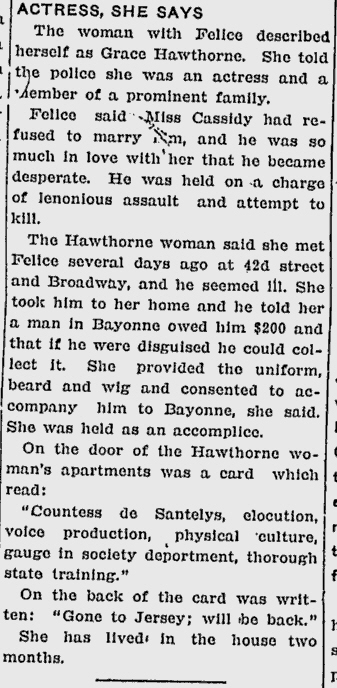 |
|||||
|
I couldn’t find any court reports of the trial, so I have no idea whether Grace Hawthorne was sent up the river to the big house and served time in Sing Sing, but it appears I was not the only one on the trail. In The Marquis de Leuville: A Victorian Fraud? by Marianne Colloms and Dick Weindling, Grace Hawthorne appears as a paramour of the ‘Marquis’, and a brief account of the ‘attempted murder’ is followed by this: “There does not appear to be any surviving record of the outcome of the incident, but eventually Grace returned to London, renting rooms near Fitzroy Square. Her financial problems persisted: she died on 22 May 1922 in St Pancras workhouse infirmary, following a stroke and her estate was granted to one of her creditors.” Later on I came across an article about Grace Hawthorne in The Sully County Watchman (of South Dakota) from 1st August, 1885, which promoted the New England ‘origins’ of the actress. And then, still in the Dakotas, I came across this - and I have no idea whatsoever. |
|||||
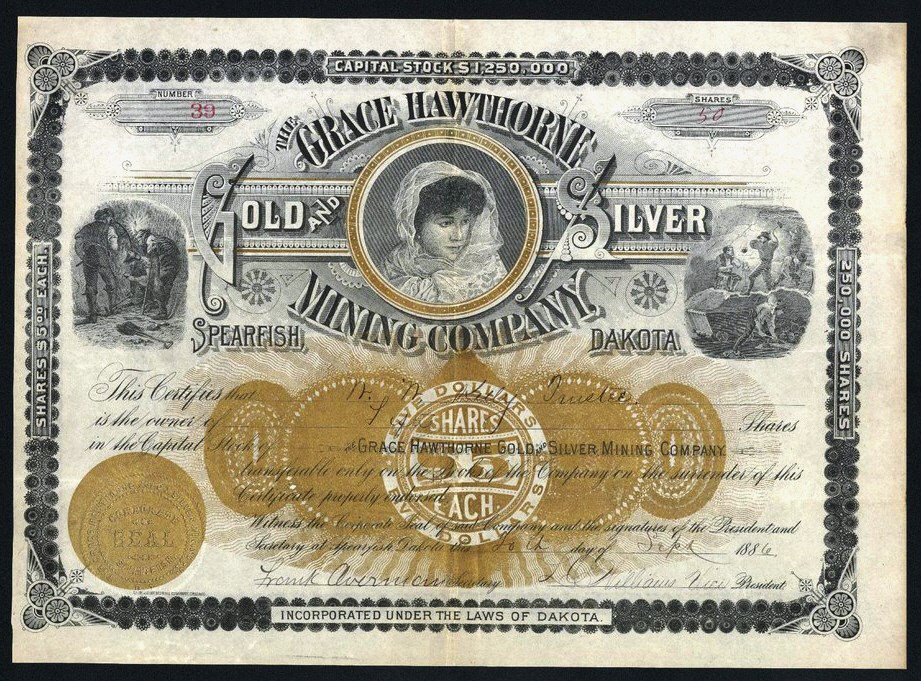 |
|
So, there I’ll leave it. I’ve already spent far longer on Grace Hawthorne and Theodora than Robert Buchanan did writing the play. |
|||||||||
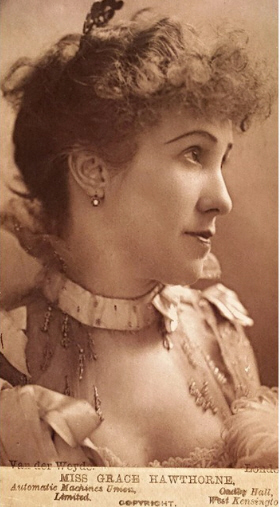 |
|||||||||
|
I spoke too soon. In August, 2021, I came across an article Harriett Jay had written for The Theatre Annual of 1888, entitled ‘How Actresses Work’. The article which preceded this was written by Grace Hawthorne, and here it is: From The Theatre Annual edited by Clement Scott (London: “The Stage” Office, 1888 - pp.55-57): A Nebraskan Experience. BY GRACE HAWTHORNE. THE “Wild West” is a term which has become sufficiently familiar to the inhabitants of London during the past few months; and doubtless those who have seen the exciting exploits of Buffalo Bill and his company of men, horses, and other animals, have been able to form some conception of the strange aspects of life which unfold themselves daily and hourly before the eyes of those wanderers from the busy haunts of civilisation who stray into the regions far beyond the Mississippi River. But the Wild West at Brompton and the Wild West in Nebraska differ as considerably as the sun at noonday in Florida differs from the sun at five o’clock tea time in London. No one will deny that it is the same sun which shines at both places; nevertheless, the resemblance is not particularly striking. So the Indians and cowboys at the American Exhibition, while incontestably genuine in every instance, are many degrees removed in the matter of “wildness” from their untutored brethren of the Western plains and hills. Colonel Cody is rendering signal service to the American Government and people by the power of civilisation which he is bringing to bear on savages hitherto untamed; and in a few more years it will be impossible to meet with such an experience as I am about to record, for cowboys—nay, perhaps the very Arapahoes themselves—will be “educated up” to the latest development in art, and will attend emotional performances at the theatres duly provided with the necessary “two handkerchiefs” required by the tear-compelling situations of the fourth and fifth acts of modern dramas. ___
And should you doubt Miss Hawthorne’s account of her Wild West adventure, here are a few newspaper cuttings. Not from North Platte unfortunately, but one from Omaha, Nebraska, one from Kansas and the last an advert from Los Angeles. The (Omaha) Daily Bee (6 June, 1885 - p.5) |
|||||||||
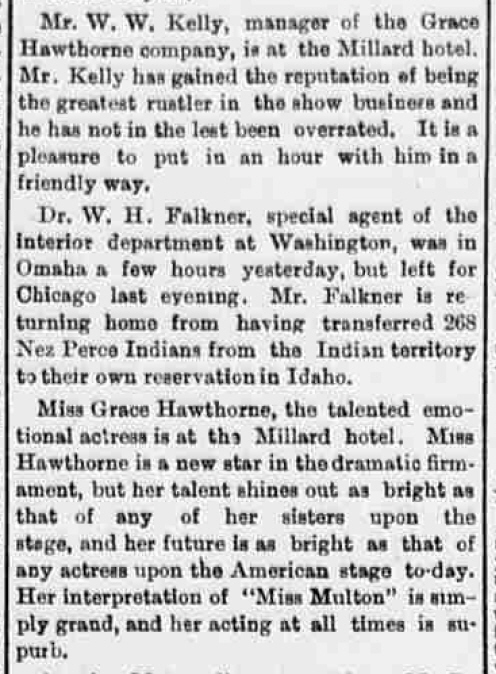 |
|||||||||
|
The Evening Tribune (Lawrence, Kansas) (20 June, 1885 - p.3) |
|||||||||
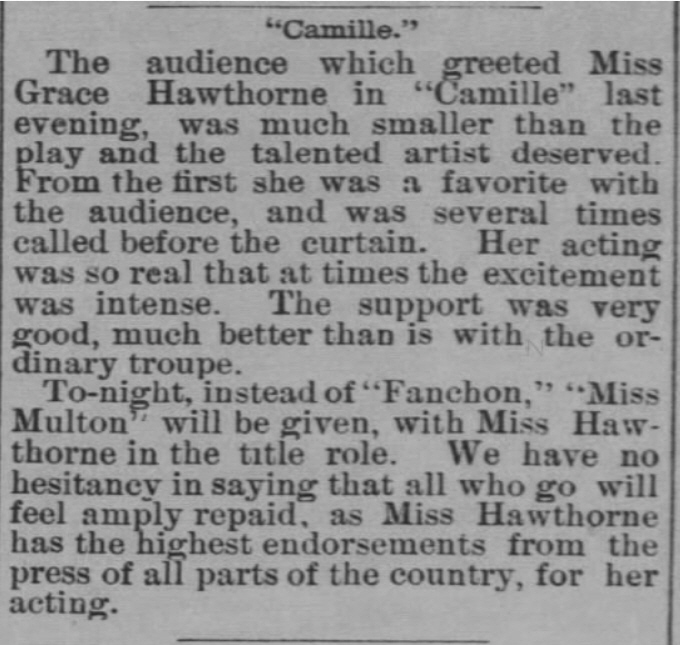 |
|||||||||
|
Los Angeles Daily Herald (4 February, 1886 - p.5) |
|||||||||
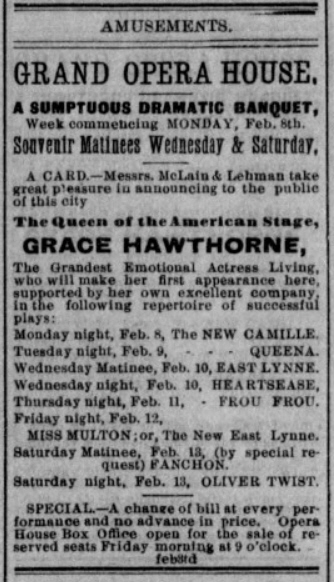 |
|||||||||
|
And that’s your lot! |
|||||||||
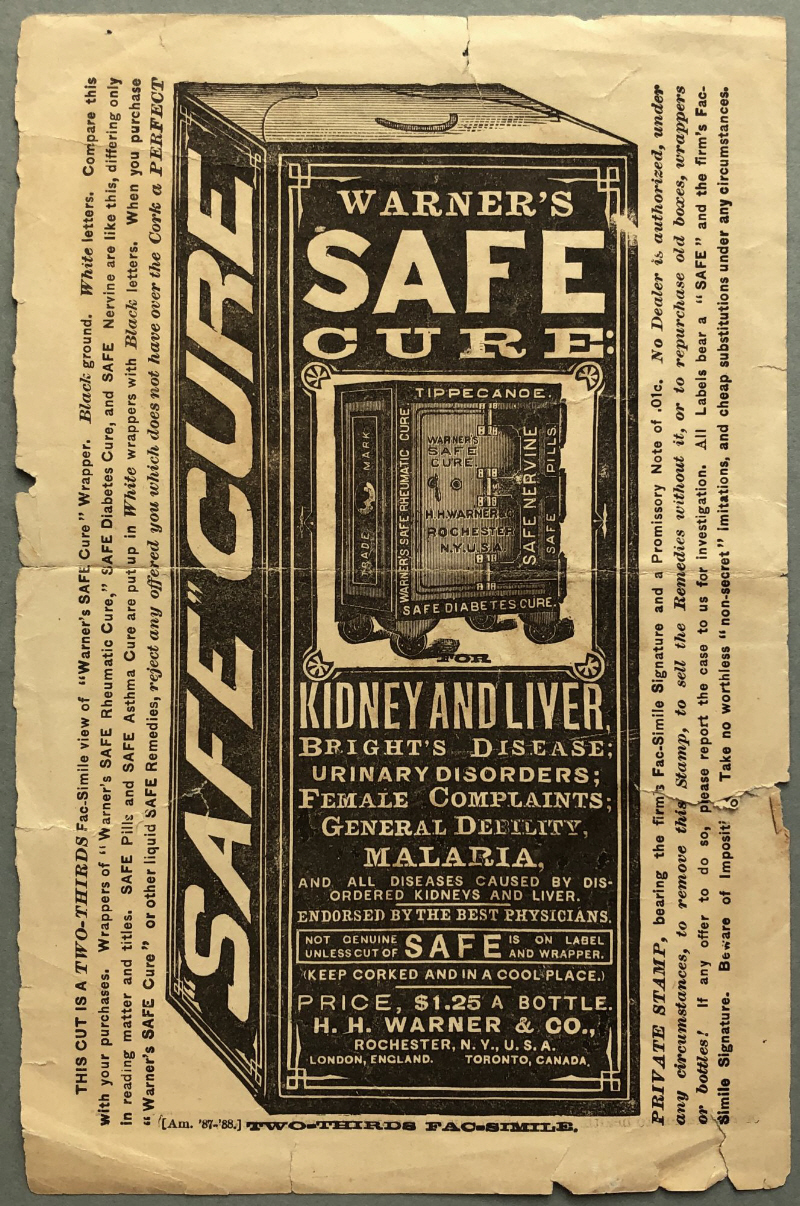 |
|
Next: Man and the Woman (1889) Back to the Bibliography or the Plays
|
|
|
|
|
|
|